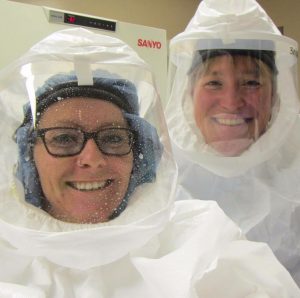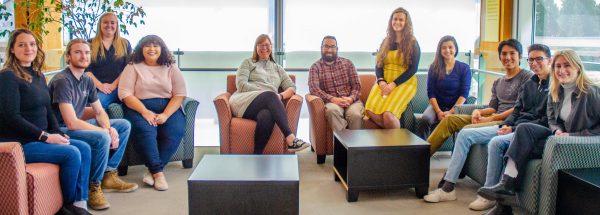Fairness First blog
Researchers voices in health equity
The Fairness First blog represents a space where researchers share with the broader community why health equity research matters to them, how do they connect to health equity, and what is the value of community engagement in the research process.
January 28, 2022
Exploring Valley fever and health equity with Bridget Barker
Associate Professor, Department of Biological Sciences
 Bridget Barker is a research-intensive tenured professor at NAU. Her research focus is the ecology/genomics of human pathogens Coccidioides immitis and C. posadasii.
Bridget Barker is a research-intensive tenured professor at NAU. Her research focus is the ecology/genomics of human pathogens Coccidioides immitis and C. posadasii.
Q. How would you describe your research and why it matters?
A. I study a fungus that causes a disease- the fungus is actually 2 species: Coccidioides immitis and Coccidioides posadasii. The disease is Coccidioidomycosis, but we use the common name: Valley fever. The disease is often misdiagnosed because symptoms are not specific (e.g., general respiratory flu-like symptoms), which leads to misdiagnosis and delayed treatment.
The fungus grows in the soil in arid regions throughout North and South America and you get sick from breathing in the fungal spores from the environment. Working with Dr. Anita Antoninka at Northern Arizona University, we are looking at the effect of biocrust restoration on the prevalence of the organism in soil.

Q. Tell us about a moment in your life when you decided, “This is the type of research I want to do!”
A. The path to studying Valley fever was not linear! I think the moment I realized this was my passion was traveling to a meeting to present my first results on the work I had done to detect the organism in the soil, and I sat next to someone that had been really impacted by the disease. It really brought it home that this work would help people, and no one else was doing it!
Q. What is the element of ‘unfairness’ or ‘inequity’ in the issue you are examining (in the broad context of health and wellbeing)?
A. Delayed diagnosis and ethnicity* are both risk factors for severe disease. Lack of access to healthcare is going to delay treatment and access to specialists in the case of severe/complicated disease, and this increases mortality risk. Additionally, certain professions (such as construction, farm workers, landscaping) are more likely to expose people to high levels of fungal spores, and this increases the likelihood of developing severe disease.
*social and geographic factors connected with certain ethnic groups can pose greater disease risk
Q. How do you see your work helping to push the needle on this issue towards “fairness” or “equity”?
A. By developing better methods to detect the fungus linked to Valley fever in the environment and identifying methods to reduce exposure, we can reduce the exposure to the organism. The disease is not passed from human to human, so targeting the environmental source of Valley fever is critical.
Q. How do you want your research to make a difference or change in this world?
A. In the short term, we hope to increase awareness—both for the public and medical professions. The more people that are aware of Valley fever, the more likely testing will occur before the onset of severe disease. In the long term, we would like to deploy a monitoring system to detect and alert the public and clinicians to the higher risk via weekly alerts. I believe that this will increase early detection and also help our research in understanding the impact of climate change on fungal diseases, including Valley fever.

Q. What is one important lesson you’ve learned about yourself and this region through your research?
A. The desert Southwest is incredibly beautiful and restoring soils in the area can have multiple benefits. This area of research is novel and exciting, but difficult to fund! I think the desert has taught me resilience and patience.
Q. Is there a global context you can apply to your research? How is your research connected to situations/advancements happening on a global scale?
A. Valley fever impacts communities in some of the most impoverished regions of North and South America. I work with researchers in Mexico, Venezuela, and Brazil to look at similar questions in these regions, as well as fungal infections more broadly. These diseases cause a great deal of morbidity (illness or unhealthy condition), including severe facial deformities, that can permanently impact a person’s ability to work and thrive.
You can connect with Dr. Bridget Barker at Bridget Barker@nau.edu to learn more about her work and potential collaboration opportunities.
Back to the main Fairness First Campaign page.